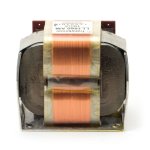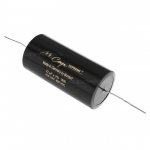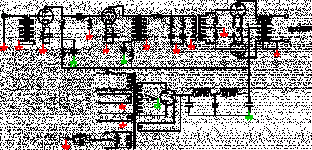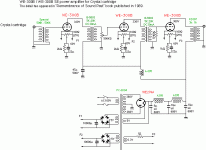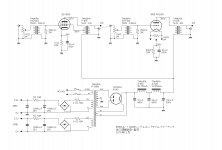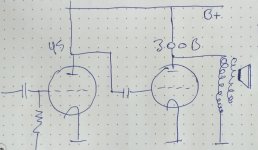When is better ?
I am not asking which one is better.
What is the relevant information to decide if is better a Capacitor or a Transformer coupling.
Maybe Plate resistance or Load resistance of next tube ?
I am not asking which one is better.
What is the relevant information to decide if is better a Capacitor or a Transformer coupling.
Maybe Plate resistance or Load resistance of next tube ?
Attachments
With an interstage transformer, you can step the output voltage of the preceding stage up or down (and the current up or down for that matter), and you can't do that with a coupling cap. Interstage transformers are also useful for driving grids into A2.
For a circuit which has feedback around it, a coupling capacitor is a far superior choice. For a circuit where the finals are not driven into A2, a coupling capacitor is a good choice.
For a circuit which has feedback around it, a coupling capacitor is a far superior choice. For a circuit where the finals are not driven into A2, a coupling capacitor is a good choice.
Transformers suffer from a number of distortion mechanisms, especially small transformers. Avoiding these problems when using a transformer is not trivial. Capacitor non-linearity are trivial by comparison. Transformer self resonance is typical less than 100KHz and can be within the audio spectrum while capacitor self resonance is typically 50MHz or higher. Any audio transformer must be loaded in order to avoid high-Q self resonance, and buffered by a relatively low impedance source in order to avoid low frequency loading. Transformer windings are a compromise between resistance losses and capacitance which aggravates self resonance frequency. Transformer cores are non-linear and saturate. Transformers are suitable for power supplies but rarely for high fidelity signals. Transformers are relatively expensive.
Transformers cost more?
Now some Duelunds or VCAP capacitors cost more than 400u$s.
Transformers suffer from a number of distortion mechanisms, especially small transformers. Avoiding these problems when using a transformer is not trivial. Capacitor non-linearity are trivial by comparison. Transformer self resonance is typical less than 100KHz and can be within the audio spectrum while capacitor self resonance is typically 50MHz or higher. Any audio transformer must be loaded in order to avoid high-Q self resonance, and buffered by a relatively low impedance source in order to avoid low frequency loading. Transformer windings are a compromise between resistance losses and capacitance which aggravates self resonance frequency. Transformer cores are non-linear and saturate. Transformers are suitable for power supplies but rarely for high fidelity signals. Transformers are relatively expensive.
I think you are overly biased against IT. Sure they are difficult to make perfect and there are compromises.
But have you listened to an amp using IT? Not to be rude but it appears not.
Btw capacitors have self resonance way below 50MHz and any audio cap bigger than an inch or two will have SRF <100kHz and those huge audiophile caps may even have SRF below 50kHz. So they need to be loaded as well. As a matter of fact even a dream perfect cap must be loaded b/c there must be a DC path at both ends.
I think post 2 from Audiowise answered the question more correctly and does not throw out ITs as very good components with very good advantages over simple caps when those characteristics are useful.
Transformer coupling was the royal choice when film caps was huge and expensive . i have tried IT coupling many times with some lundhal models and at the end allways ended with RC coupling with a cheap russian silvermica cap . there is another path if you have power tube with current on the grid it's the CL coupling but you need a bigger Cap to avoid low F resonnance ( usually 1uf)
my choice :
for pentode driver CR coupling is the best choice ( high R)
for high mu triode IT coupling
for DHT low mu (high R) LC or CCS /CR
my choice :
for pentode driver CR coupling is the best choice ( high R)
for high mu triode IT coupling
for DHT low mu (high R) LC or CCS /CR
Last edited:
Transformers are suitable for power supplies but rarely for high fidelity signals.
I agree, rarely is anything good enough for high fidelity signals
And yes, the majority of transformers mentioned daily in these threads are not good for anything audio.
But that does not change the fact that some are really good and a small fraction are exceptional.
My transformer coupled valve pre has less than 0.015% distortion at 1kHz and a bandwidth of 70kHz with no nfb, so i don't really know what's the big fuss about transformer non-linearities.
I think its a matter of the pocket book and the particular amplifier. Some say transformers color the sound and I would have to question that since most of us would probably take a hard look at the transformer response prior to purchasing them. I always plot the response of transformers or I did before I retired since I had access to the test gear. Sure there is probably some insertion loss and possibly some frequency loss. Very few time have I actually plotted the response and saw a change. One transformer I tested added a little bit to the low end and most were flat. I could go either way myself its just a question if I can get what I want. I personally feel the older transformers were better than the newer ones but they come with a stiff price.
As far as $1000.00 for a pair of caps.....well I have other hobbies too like punching holes in paper at 800 yards away. Each hobby demands that one take a look at the equipment and toys and make a balanced decision which way to go.
As far as $1000.00 for a pair of caps.....well I have other hobbies too like punching holes in paper at 800 yards away. Each hobby demands that one take a look at the equipment and toys and make a balanced decision which way to go.
my choice :
for pentode driver CR coupling is the best choice ( high R)
for high mu triode IT coupling
for DHT low mu (high R) LC or CCS /CR
The first two lines make good sense to me. Having built quite a few DHT amps not sure i understand the third. A transformer has strong advantages in that particular case.
My favourite method is a plate choke and a teflon coupling cap, like one of the Russian ones (K72, FT-3).
I prefer even using an interstage with just its primary acting as a plate choke. For me I find the signal is cleaner.
As above, interstages are useful for step-up and step-down. For 1:1 I prefer a plate choke.
I prefer even using an interstage with just its primary acting as a plate choke. For me I find the signal is cleaner.
As above, interstages are useful for step-up and step-down. For 1:1 I prefer a plate choke.
Well what's the performance at 100Hz? Or 20Hz? Transformers struggle at the low end due to saturation. PP caps can be less than 0.0001% distortion and nice and cheap, with less hum pickup.My transformer coupled valve pre has less than 0.015% distortion at 1kHz and a bandwidth of 70kHz with no nfb, so i don't really know what's the big fuss about transformer non-linearities.
I prefer even using an interstage with just its primary acting as a plate choke. For me I find the signal is cleaner.
If you compare a Lundahl 1660 interstage used as a choke to a similarly specced Lundahl choke you may find most of the transformer's resonances evident even when used as a choke. The real choke, otoh allows for a nearly perfect square wave.
Subjectively, i agree with you. A poor transformer sounds worse, especially at the high end than when used as a choke load.
I agree, rarely is anything good enough for high fidelity signals
And yes, the majority of transformers mentioned daily in these threads are not good for anything audio.
But that does not change the fact that some are really good and a small fraction are exceptional.
My transformer coupled valve pre has less than 0.015% distortion at 1kHz and a bandwidth of 70kHz with no nfb, so i don't really know what's the big fuss about transformer non-linearities.
I know are Tamura and Tango transformers , but what about this ?
Attachments
Last edited:
Some great posts here. I would only add that transformers tend toward being a better choice as voltage increases. Always, the best result is obtained when you listen to both.
I do not know why , some people tell , nothing better than a good (Decent) IT transformer.
Some claim that a mediocre capacitor is better.
But would I like to know when it could be better?
I am building a amp with 45 driving a 300B. Is posible with Cap or only could be with one IT among them.
Attachments
Last edited:
Is posible with Cap or only could be with one IT among them.
Possible with both of course. A transformer or choke load will maximise the voltage range of the driver. A transformer will also make fixed bias more stable and eliminate blocking distortion.
Sonic presentation is also different but a question of personal preference.
- Status
- This old topic is closed. If you want to reopen this topic, contact a moderator using the "Report Post" button.
- Home
- Amplifiers
- Tubes / Valves
- When is better ? Capacitor or Transformer Interestage. No which one is better.
